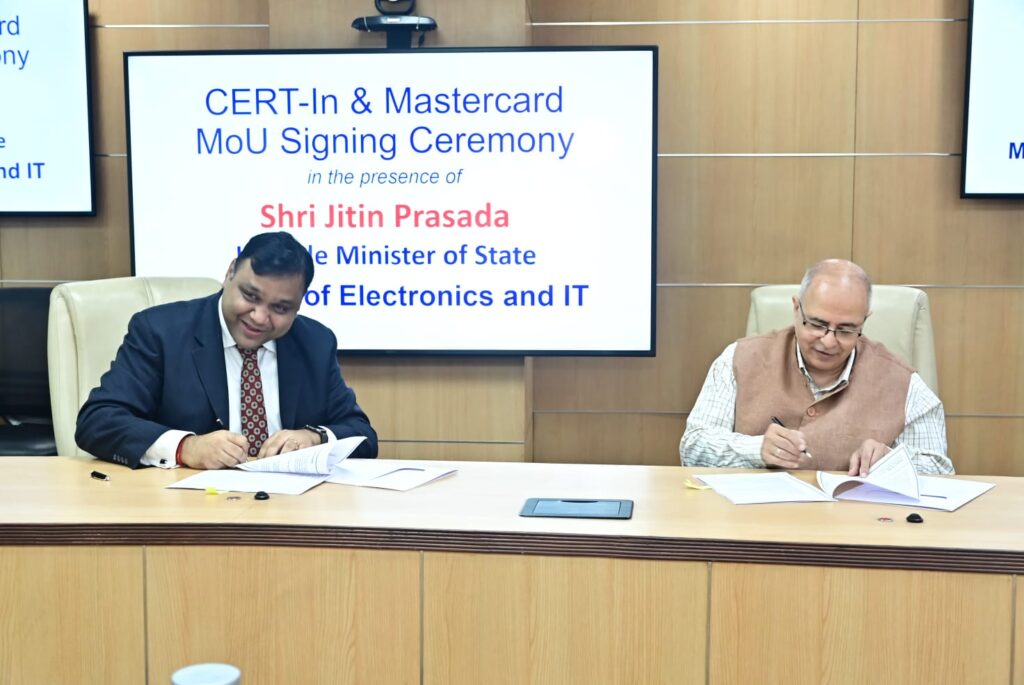Indian digital watchdog CERT-In, responsible for protecting payments of millions of Indians transacting online, has signed an MoU with Mastercard to bolster the cybersecurity of India’s financial sector.
World’s largest online payments ecosystem flourishing under Digital India mission aims to leverage shared expertise of CERT-In and Mastercard in cybersecurity incident response, capacity building and advanced malware analysis specific to the financial sector.
The collaboration involves training programs, workshops, and the sharing of cyber threat trends, technical information, threat intelligence, and vulnerability reports to enhance the information security of financial sector organizations in India.
The Indian Computer Emergency Response Team, or CERT-In, is a Government agency supposed to respond to cybersecurity incidents.
“Cybersecurity is the need of the hour and Prime Minister Narendra Modi government is committed to ensuring that people on digital platforms are secure, as this warfare is not on the ground but in cyberspace. I am confident that this is an important milestone that will benefit not only both entities but also the public at large,” Jitin Prasada, Minister of State in the Ministry of Electronics and Information Technology.
“Mastercard’s comprehensive approach to security gives its partners and customers deeper visibility into cyber risk and greater adaptability and resilience, protecting their systems through the latest AI technology. The company is delighted to collaborate with CERT-In to fortify India’s financial digital ecosystem, which has powered unprecedented growth in the country,” said Gautam Aggarwal, Division President, South Asia at Mastercard.

India accounts for 46 per cent of world’s payment done online. Nearly 80 per cent of payments are now done through government controlled UPI and the payments traffic has grown 90 times in last 12 years. In 2012-13, there were 1.62 billion digital payments and number grew to 147.26 billion in 2023-24 till February.
The unprecedented scale of transactions has also required government stay ahead of cybercriminals and online swindlers and its agencies have been cracking on culprits from time to time to keep things under its control and protect trust of the common user at the other end of the system.
Department of Telecom has developed ASTR (Artificial Intelligence and Facial Recognition powered Solution for Telecom SIM Subscriber Verification ) an AI/ML-based engine to detect mobile connections taken on fake or forged documents. This initiative has blocked around 140 thousand mobile handsets linked to disconnected mobile connections or misused in cybercrime, phishing and financial frauds.
Additionally, the Department of Telecom analyzed 35 lakh principal entities sending bulk SMSs, blacklisting 19,776 entities involved in sending malicious SMSs, and disconnecting 30,700 SMS headers and 1,95,766 SMS templates. The Pratibimb portal, which plots SIM and IMEI of suspected fraudsters in real time, has enabled law enforcement agencies to identify and locate suspects, leading to over 500 arrests, the blocking of around 308 thousand SIMs, approximately 50 thousand IMEI blocks, and the blocking of 592 fake links and 2,194 URLs since April 2023.
To date, approximately 70 lakh mobile connections involved in cybercrime and financial frauds have been disconnected, and Rs. 900 crore of defrauded money has been recovered, benefiting around 3.5 lakh users.
The government is also onboarding banks and financial institutions on the Citizen Financial Cyber Fraud Reporting and Management System platform through API integration. It is integrating this fraud reporting system with the National Cybercrime Reporting Portal to enable effective collaboration between police, banks, and financial institutions for real-time monitoring and fraud prevention.
Banks and financial institutions are required to phase out the use of regular 10-digit numbers for commercial activities and use specific number series such as ‘140xxx’ for commercial and promotional activities as prescribed by TRAI. Ensuring round-the-clock availability of resources to promptly address complaints and formulating action plans for returning funds to victims of fraud is also in focus of government.
From time to time Government reviews issues related to cybersecurity and the increasing incidents of online financial frauds and gloats over the latest statistics on digital payment frauds and proactive strategies to mitigate such frauds.



